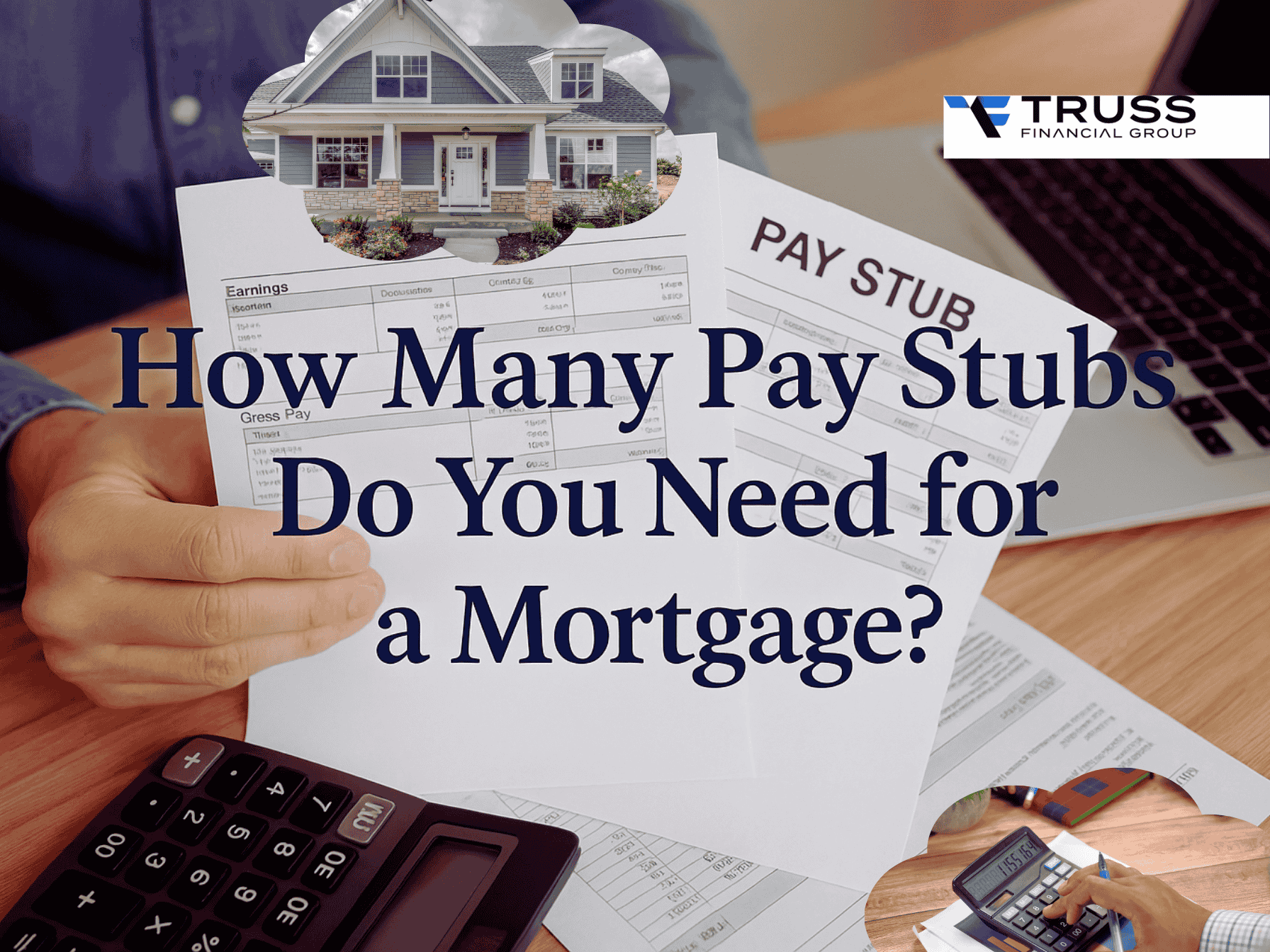8 min read

When applying for a mortgage, proof of income is key and pay stubs play a major role.
Most lenders require 2–3 recent pay stubs (covering 30 days of income) to confirm your employment, income stability, and ability to manage monthly mortgage payments.
Lenders may also ask for:
-
Bank statements (last 2 months)
-
Tax returns (last 2 years)
-
Photo ID and credit report
-
Gift letters or legal documents if applicable
If you’re self-employed, you’ll need 2 years of tax returns, P&L statements, and business bank statements instead.
Digital portals now make it easier to upload and e-sign documents securely.
Ultimately, lenders care more about income consistency and financial stability than the exact number of pay stubs.
For guidance through every step, contact Truss Financial Group, your partner in stress-free home financing.
Thinking about buying a home and wondering how many pay stubs you need for a mortgage? You’re not alone. When it comes to the mortgage application process, having the right proof of income including pay stubs, bank statements and tax returns can make or break your approval.
Mortgage lenders use these documents to check your financial stability, credit history, and whether your monthly income is consistent enough to cover mortgage payments. In this guide, we’ll break down everything you need to know step by step. If you're getting ready to apply, visit our process overview page or contact us to get started.
Understanding Mortgage Applications
Applying for a mortgage might seem overwhelming, but once you know what lenders are looking for, it becomes a lot easier. Mortgage lenders assess your ability to repay a home loan by reviewing your income, employment history, credit report, and overall financial health.
They’ll ask for documents like:
-
Recent pay stubs
-
Tax returns
-
Bank statements
-
A valid photo ID (like a driver’s license)
These items help lenders evaluate your creditworthiness and financial stability, two major factors in mortgage approval.
Why Pay Stubs Matter in Mortgage Applications?
Pay stubs are one of the most important pieces of documentation when applying for a mortgage. They tell lenders:
-
How much income you earn
-
Whether your income is consistent
-
Who your employer is and how long you’ve worked there
-
Your gross income vs. net income after tax deductions
Lenders typically require recent pay stubs to verify that you can handle monthly mortgage payments and other debt payments. Having a stable income gives them the confidence that you’re financially prepared for a long-term home loan.
How Many Pay Stubs Do You Need for a Mortgage?
Here’s the short answer: most lenders ask for two to three of your most recent pay stubs. This usually covers the last 30 days of employment. If you’re paid weekly, that might mean three to four pay stubs. If you’re paid biweekly or monthly, two should do the trick.
.png?width=1024&height=768&name=TFG%20(94).png)
But it’s not just about the number, it’s about the story they tell. Your pay stubs need to reflect:
-
Consistent income
-
Ongoing employment
-
Alignment with the income you report on your mortgage application
If your income fluctuates or you've recently changed jobs, expect your lender to ask for more documentation to support your financial stability.
What About Self-Employed Individuals?
If you’re self-employed, you won’t have traditional pay stubs. Instead, mortgage lenders will ask for:
-
At least two years of tax returns
-
Year-to-date profit and loss (P&L) statements
-
Business bank statements
-
Possibly your business license or incorporation documents
Self-employed individuals often face more scrutiny because income can vary month to month. But don’t worry, many lenders offer programs for self-employed borrowers, including VA loans and conventional loans with flexible income verification.
Other Documents Lenders Require – including information about no documentation mortgages
While pay stubs are crucial, they’re only part of the equation. You’ll also need to provide:
-
Bank statements (last 2 months) to verify your assets and spending habits
-
Tax returns (last 2 years), especially if you're self-employed
-
Credit report to assess your creditworthiness
-
Photo ID, like a driver’s license, to verify your identity
-
Gift letters, if someone is helping you with your down payment
-
Divorce decrees or child support documents, if applicable
These income documents help lenders get a full picture of your financial situation and your ability to keep up with mortgage payments.
Mortgage Pre-Approval: What You Need to Know
Getting pre-approved for a mortgage is a smart move before house hunting. It gives you a clear idea of how much you can afford and shows sellers you’re a serious buyer.
.png?width=1024&height=768&name=TFG%20(96).png)
During pre-approval, lenders will evaluate:
-
Your debt-to-income ratio
-
Your credit history and score
-
Your income, via pay stubs, tax returns, and bank statements
Most lenders require a credit score of at least 620 for a conventional loan. Having cash reserves for a few months of mortgage payments can also boost your chances.
Stable Income and Employment History
Lenders love to see stability. If you’ve been with the same employer for two or more years, you’re already ahead. If you recently changed jobs but stayed in the same field, that’s usually fine too.
What lenders don’t want to see:
-
Large gaps in employment
-
Unexplained income jumps or drops
-
Inconsistent earnings month to month
Make sure your documents align. Your pay stubs should match what’s on your tax returns and bank statements. If anything looks off, be ready to explain.
Digital Documentation and E-Signatures
Good news: most mortgage lenders now accept digital files. You can upload your pay stubs, bank statements, and tax returns directly through secure online portals. Some lenders even offer fully online mortgage applications with e-signatures, which saves time and cuts down on paperwork errors.
.png?width=1024&height=768&name=TFG%20(95).png)
What Happens After You Apply?
Once you submit your application, the lender reviews everything. They might:
-
Ask for additional documentation or clarification
-
Offer conditional approval
-
Schedule a home appraisal
-
Move you toward closing
During closing, you’ll finalize the loan, pay any remaining closing costs, and officially become a homeowner. Be prepared to update or resend pay stubs or other documents if the process stretches out.
FAQs: Quick Answers to Common Questions
How many pay stubs do mortgage lenders need?
Most lenders need 2–3 recent pay stubs that cover 30 days of income.
Can I buy a house with only 1 year of work history?
It depends. A strong credit score and consistent income can help offset a shorter employment history.
Do I need 2 years of pay stubs to get a mortgage?
No, just the last 30 days of pay stubs. But lenders will want to see 2 years of employment history.
How many months of bank statements do I need?
Typically, you’ll need to submit 2 months of bank statements.
What if I'm self-employed?
You'll need 2 years of tax returns, a P&L statement, and business bank statements.
Final Thoughts
Knowing how many pay stubs you need for a mortgage is just one piece of the puzzle. Whether you’re a salaried employee or self-employed, what lenders really want is proof of steady, reliable income and financial responsibility. Gather your documents, stay organized, and don’t be afraid to ask your lender what they need.
You can get started with Truss Financial Group today. We’re here to help you every step of the way from application to closing.
Table of Content

Take your pick of loans
Experience a clear, stress-free loan process with personalized service and expert guidance.
Get a quote


